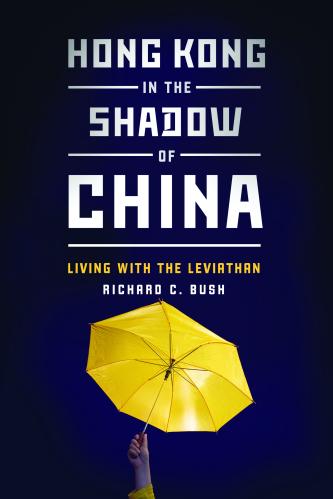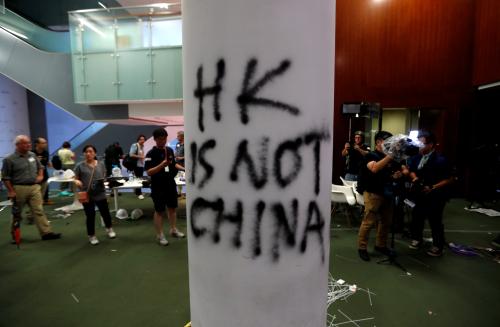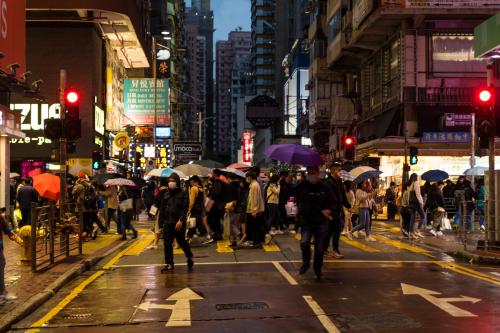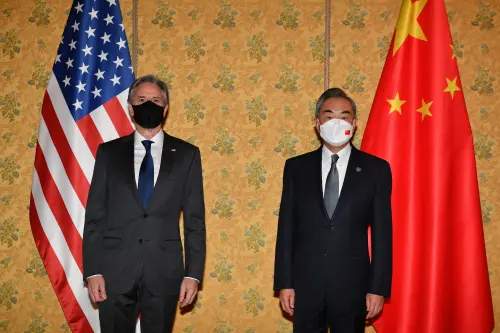This piece is part of the ongoing collaboration between the John L. Thornton China Center at Brookings and the Paul Tsai China Center at Yale Law School. Learn more here.
Many different people are looking at the ongoing turbulence in Hong Kong from different perspectives. This includes politicians in other countries and those with all manner of agendas in China, Hong Kong, Taiwan, East Asia, and further afield. Most businesspeople wish for a return to stability and a restoration of the status quo ante. Many other observers are rooting for the voices of the people of Hong Kong to be heard in an overbearing political environment. Some are clamoring for a fight and want to see Beijing’s nose bloodied.
There is no doubt about Beijing’s agenda. In the near term, it wants the protests halted and the protesters quashed. While Beijing would prefer Hong Kong authorities to do what’s necessary to restore order, they also have removed any pretense of subtlety about their willingness to take matters into their own hands, should they deem it necessary. Over the medium term, Beijing would like to tighten control over Hong Kong and prevent it from becoming enveloped in instability again.
Hong Kong authorities likewise seek to restore calm and protect the city’s reputation as an orderly, business-friendly, and open environment. This will be difficult. The protests have shed light on deep public dissatisfaction with the current state of affairs. Millions of people have gone to the streets to resist the erosion of civil and political rights that the Hong Kong people were promised. They have expressed anger that hopes of upward mobility are being taken away, as the trappings of the city’s prosperity increasingly are being concentrated in the hands of the politically connected. These resentments have sown the seeds of public protest, and even led some to advocate provoking or resorting to violence as a way to reach amorphous goals.
Many people in the United States and elsewhere want to use events in Hong Kong to punish or undermine Beijing. This is a dominant and understandable impulse in the West. After all, irrespective of whether the idea to ram through an extradition law was initiated by authorities in Hong Kong or Beijing, the effort was designed to support Beijing’s desire to gain greater control over events in Hong Kong.
Even as anger is warranted, sobriety is needed. Policymakers must think carefully about how the United States should respond to unfolding events. The measure of success is not projection of strength, but rather protection of American interests.
The United States has direct interests in Hong Kong. Over 85,000 American citizens live there, and nearly 1,400 American businesses operate there. The U.S. trade surplus in Hong Kong in 2017 was $32.6 billion. In other words, U.S. economic interests in Hong Kong are significant.
Given these direct interests, the U.S. has a strong incentive to support efforts to preserve Hong Kong’s high degree of autonomy and its model of a vibrant, open, rule-of-law society that is a part of China. The use of violence by any side in the ongoing confrontation undermines American interests. It would run counter to American interests for Beijing to weaken Hong Kong, including by narrowing its autonomy, e.g., by eroding legal, judicial, media, assembly, or speech freedoms. By the same token, the peaceful exercise of political freedoms by protesters provides a stronger likelihood of long-term stability than actions that precipitate the imposition of tighter political controls.
The United States also has an interest in defending American values and its example. The world is watching to see whether the U.S. stands up for the right to free speech and peaceful political protest, rights that are enshrined in Hong Kong’s Basic Law. No matter what Washington does or does not do, Beijing will complain about American “interference” in Hong Kong’s internal affairs. There is no reward to be gained for silence on Hong Kong. But there will be significant and lasting costs if the United States abandons support for peaceful demonstrators.
There will be significant and lasting costs if the United States abandons support for peaceful demonstrators.
The U.S. response must be guided by these interests, including by:
- Calling for calm and condemning violence. As obvious as this seems, it is not happening now. The United States government must not grow mute on its position on violent protests, violent crackdowns on protesters, or vandalism and destruction of property.
- Defending the right to peaceful protest, while at the same time insisting that a broadly supported peaceful resolution of differences is the only acceptable endgame.
- Urging Hong Kong authorities and protest leaders to work toward solutions. When every grievance gets expressed through mass protests, the city increasingly will become a powder keg, at which point any event could become a fuse that sets off confrontation.
- Expressing support for stability and prosperity in Hong Kong, including by emphasizing that stability and prosperity are underpinned by an open society, maximum autonomy, transparent and fair administration of the law, and the expansion of political participation.
- Openly and directly rejecting the canard that the United States is instigating or directing the protests.
- Proactively and privately emphasizing to Beijing through diplomatic channels that any actions by China’s People’s Liberation Army (PLA) to leave garrison to suppress peaceful protests would cause grievous damage to U.S.-China relations. Washington also should encourage other similarly concerned countries to reinforce this message with Beijing as well.
American interests will neither be protected by complacent disregard of events in Hong Kong nor by overzealous efforts to strip away recognition of Hong Kong’s special status, which would do more to harm the people of Hong Kong than to influence Beijing’s decisionmaking. Silence on Hong Kong or praise for President Xi Jinping’s handling of the protests will not make a U.S.-China trade deal easier to achieve. By the same token, demands or prescriptions of how the ongoing standoff between protesters and authorities should be resolved would be counterproductive. The United States should not narrow Hong Kong’s space to negotiate a way out of the current impasse.
Hong Kong matters greatly to American interests. The United States needs to stand firm on principle and act steadily in defense of its interests. The United States has navigated through similar challenges in Hong Kong in the past. It needs to regain that muscle memory again in the present.
The Brookings Institution is committed to quality, independence, and impact.
We are supported by a diverse array of funders. In line with our values and policies, each Brookings publication represents the sole views of its author(s).







Commentary
On Hong Kong, the US must find its voice
July 30, 2019